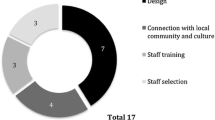Abstract
Against a historical background, this paper explores language-related challenges that have arisen in Lithuania since the cessation of Soviet hegemony. The reinstatement in 1990 of the official status of Lithuanian led to the gradual replacement of Russian in public life. Provisions were made for public-sector employees and other members from the ethnic communities to become proficient in the state language, and laws were introduced for the protection of minority languages and cultures.Lithuania's two major ethnic groups, the Russians and the Poles, have responded differently to integration, requiring different educational measures to support the diverse needs of a society in transition. In contrast to the other Baltic states, where the proportion of Russians and other non-indigenous minorities is greater, Lithuanian language and education policies have been successful in promoting social integration whilst at the same time safeguarding cultural and linguistic diversity.
Similar content being viewed by others
REFERENCES
Agenda 2000 – Commission's opinion on Lithuania's application for membership of the European Union. Brussels, 15 July 1997. http://europa.eu.int/comm/enlargement/dwn/ opinions/lithuania/li-op-en.pdf.
Clyne, Michael (1997). Multilingualism. In Florian Coulmas (Ed), The handbook of sociolinguistics (pp. 301–314). Oxford: Blackwell.
Constitution of the Republic of Lithuania (1993). Vilnius: Publishing House of the Seimas.
Denison, Norman (1982). A linguistic ecology for Europe? Folia Linguistica, 21(1–2), 11–35.
de Varennes, Ferdinand (1996). Language minorities and human rights. International Studies in Human Rights, vol. 45. The Hague/Boston/London: Martinus Nijhoff Publishers.
Druviete, Ina (2000). Sociolinguistic situation and language policy in the Baltic States. Riga: Latvijas Universitate.
Edwards, John (1985). Language, society and identity. Oxford: Blackwell.
European Committee under the Government of Lithuania (2001). Lithuania. An outline. Vilnius: Akreta.
Fasold, Ralph (1984). The sociolinguistics of society. Oxford: Blackwell.
Giles, Howard & Coupland, Nikolas (1991). Language: Contexts and consequences. Milton Keynes: Oxford University Press.
Haugen, Einar (1972). The ecology of language. Stanford: Stanford University Press.
Harrison, E. J. (1922). Lithuania past and present. London/Woking: T. Fisher Unwin/The Gresham Press.
Hogan-Brun, Gabrielle (2003). Baltic national minorities in a transitional setting. In Gabrielle Hogan-Brun & Stefan Wolff (Eds), Minority languages in Europe: Status – frameworks – prospects. Houndsmills/New York: Palgrave (in press).
Hogan-Brun, Gabrielle & Ramoniene, Meilute (2002). Locating Lithuanian in the (re-)intellectualization debate. Current Issues in Language Planning, 3(1) (in press).
Hogan-Brun, Gabrielle & Ramoniene, Meilute (in press). Changing levels of bilingualism across the Baltic. The International Journal of Bilingual Education & Bilingualism.
Integratsioonikomisjoni materjalid. [Material of the Commission for Integration.] (http://www.riik.ee/saks/ikomisjon).
Juozeliuniene, Irena (1996). Individual and collective identity. In Meilute Taljunaite (Ed), Changes of identity in modern Lithuania. Social studies (pp. 194–213). Vilnius: Lithuanian Institute of Philosophy and Sociology.
Law on the State Language. http://www3.lrs.lt/cgi-bin/preps2?Condition1=21941&Condition2=
Leclerc, Jean (1992). Langue et société. Laval, Canada: Mondia.
Lietuvos statistikos metraštis/Statistical Yearbook of Lithuania (1997). Vilnius: Metodinis Leidybos Centras.
Mikuleniene, Danguole & Palionyte, Jurate (Eds) (1997). Lietuvos Respublikos valstybine kalba. [State language of the Republic of Lithuania.] Vilnius: Mokslo ir Enciklopediju Leidybos Institutas.
National minorities in Lithuania (2000). Vilnius: Department of National Minorities and Lithuanians Living Abroad.
OSCE report of the linguistic rights of persons belonging to national minorities in the OSCE area (1999). The Hague: Organization for Security and Co-operation in Europe. High Commissioner on National Minorities.
Savukynas, Virginijus (2000). Lietuvos lenkai ir rusai: dvi skirtingos laikysenos. [Lithuania's Poles and Russians: Two different perspectives.] Politologija, 2(18), 67–84.
Skultans, Vieda (1998). The testimony of lives. Narrative and memory in post Soviet Latvia. London/New York: Routledge.
Tautiniu mažum? pad?tis Lietuvos Respublikoje (http://www.is.lt/tmid/mazumos.htm).
The situation of national minorities in the republic of Lithuania (http://www.is.lt/ tmid/anglo/minorities.htm).
Trinkūnienė, Inija (1996). Ethnic relations and stereotypes. In Meilutė Taljūnaitė (Ed), Changes of identity in modern Lithuania. Social studies (pp. 183–194). Vilnius: Lithuanian Institute of Philosophy and Sociology.
Trudgill, Peter (1995). Sociolinguistics. An introduction to language and society. London: Penguin.
Vaitiekus, Severinas (Ed) (1992). Tautinės mažumos Lietuvos respublikoje. [Ethnic minorities in the Republic of Lithuania.] Vilnius: Valstybinis Nacionaliniu Tyrim Centras.
Vardys, V. Stanley & Sedaitis, Judith B. (1997). Lithuania. The rebel nation. Boulder, Colorado/Oxford: Westview Press.
Zaagman, Rob (1999). Conflict prevention in the Baltic States: The OSCE high commissioner on national minorities in Estonia, Latvia and Lithuania. Monograph #1. Flensburg: European Centre for Minority Issues (ECMI).
Zinkevi?ius, Zigmas (1998). The history of the Lithuanian language, trans. Ramut? Plioplys. Vilnius: Mokslo ir Enciklopedij? Leidybos Institutas.
Author information
Authors and Affiliations
Rights and permissions
About this article
Cite this article
Hogan-Brun, G., Ramonienė, M. Emerging Language and Education Policies in Lithuania. Language Policy 2, 27–45 (2003). https://doi.org/10.1023/A:1022933612844
Issue Date:
DOI: https://doi.org/10.1023/A:1022933612844




